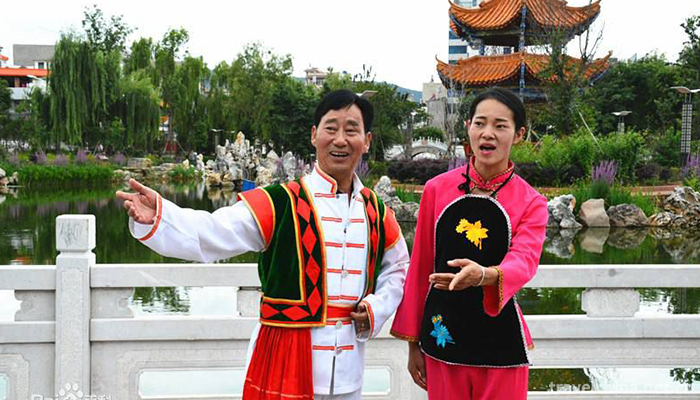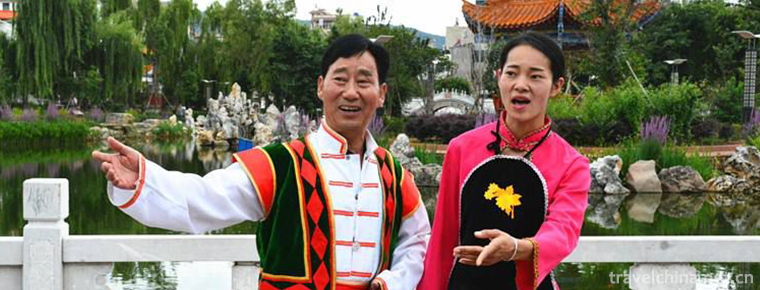Yao an Bazi Cavity
Yao an Bazi Cavity
Yao'anba Ziqiang is a traditional folk song in Yao'an County, Yunnan Province. Yao'an Pingchou Guangchuan is one of the dams in central Yunnan.
On June 7, 2008, Yao'an Baziqiang, declared by Yao'an County, Yunnan Province, was listed in the second batch of national intangible cultural heritage list with the approval of the State Council. Heritage serial number: 595 II-96.
historical origin
Yao'anba Ziqiang is the most primitive ballad formed in the production and life of the peasants among Yao'anba Ziqiang's ancestors. It is either rough and warm, or long and desolate, sincere and sincere. In order to collect this wonderful flower of folk music, I have visited these tunes many times in the countryside villages. Unexpectedly, it is a music history that has undergone tremendous changes in rural areas in the past 30 years since the reform and opening-up.
artistic characteristics
Baziqiang, as its name implies, originated from the folk songs of Yao'an Bazi during spring cultivation and cultivation. The melody is euphemistic and fluent, with wide range, large melody jump, and the structure of Ci Fu is quite special. After continuous singing by the masses and modification by musicians, it is finally set up on the literary and artistic stage, which has become a major feature of Yao'an County's traditional culture.
The lyrics are composed of two main words and adverbs. Generally speaking, the main words are two sentences and the adverbs are six to ten sentences. There is no direct connection between the main words and adverbs in the content, but the melody is inseparable and interdependent in the whole aria. The so-called adverb is what folk artists call "stacking leaves", that is, stacking plates. For example, "Send Lang", the main words are: Send Lang to Mixing Street, Mixing straw hat put off the street; Adverbs are: Sanjiangkou horse grass, left door to Mizuo, Zuomi, Mizuo, Shangzhuang to Baishidi, Yao'an is a good treasure land.
Yao'anba Ziqiang is the most primitive ballad formed in the production and life of the working people among the generations of Yao'anba Ziqiang. It is either rough and warm, or long and desolate, sincere and sincere.
In the Dazi Tune which is moved onto the stage, Niu Song is often used only as a passing door and ending, such as: Oh wow (go)... Whoa (on the left)... Wow, come back, huh (turn left)... Whoa, Whoa, Whoa (on the right)... Wow station (stop)... Wait or howl or hum at will, fast or slow, to create an atmosphere. The main body of the Bazi tune is singing songs. The male and female voices are singing in pairs, usually in the field. Singing usually starts with a long, soft slippery voice: "You say (younger sister/brother/benevolence and righteousness) hey..." At first, the content is improvised lyrics, mostly seven-character sentences, mainly funny, but also praise the scenery and beautiful life. In the meantime, some relatively fixed "stamping leaves" of different lengths are mixed randomly, that is to say, singing songs. For example: the first three steps, the last three steps, the third three steps, nine steps, plus two steps and eleven steps... I want to go shopping with my little sister (brother)!
"Ah - Yao'an dam is long and long. When seedlings are planted on the dam and the dam is dry, a sudden thunderstorm comes and the dam is flooded into a river. Frequent droughts and floods make people sad, and famine breaks out in the land of fishing and rice. This Lyric reminds me of the hungry eyes of the villagers. In that year, the countryside could not do anything about farmland and water conservancy construction. Most of them depended on heaven for food. The canteen had two or two grains per person every day. Nowadays, Yao'an Bazitian Domain Rice and Wheat Competition Show, they sang from the bottom of their hearts, "Two feet on the road of happiness, a stroll to the highway, home singing variations..."
The dam cavity is divided into upper dam cavity and lower dam cavity. If subdivided further, the East Dam Cavity and the West Dam Cavity can also be separated. What is more peculiar is that the Yis mountain area around Dazi also sings a tune similar to the Dazi tune, commonly known as "small variation tune", which is different from the pure Dazi tune. It is a kind of song style derived from the influence of the Dazi tune of the Yi folk song, and it is a variation tune based on the Dazi tune. It is also improvised lyrics, solo or duet singing, often with "A Mei/Lao Biao" as a backword, or with dialogues in the line to say with the vocal tape, using imprecise seven-character rhyme sentences. Generally speaking, "..." Renyilai (er)..." Or "You say dew, hey little brother (sister) said..." Start. The melody is graceful, lingering or sobbing, and its vivid appeal depends entirely on the singer's singing ability.
Representative Works
The dripping raindrops fell on the pavilion lotus leaves. Lotus flowers of various colors swayed gently with the wind, and visitors from all sides came in endlessly. On the morning of August 2, in the drizzle of lotus fragrance, the first Lotus Festival of China Yao'an in 2013 opened at the Hetang people's house in Guanglu ancient town.
In a warm applause, actors dressed in gorgeous costumes performed "Lotus Flowers Blossom" and "Lotus Rhyme" and other programs with the theme of "Lotus". They sang Yi songs "A Lao Bie" and "Da Song", and displayed the intangible cultural heritage with local characteristics such as "Meige" and "Yao'anbazi Tune". Ecotourism is well integrated with Yi culture and local culture. Wandering in the green lotus pond and indulging in the melodious songs, the guests in Yao'an, the Lotus City, experienced the pleasure and comfort of "the Lotus can be picked in the south of the Yangtze River, the lotus leaf He Tiantian".
Inheritance Significance
As a representative of Chinese traditional culture, Yao'an Bazi Tune reflects the cultural characteristics of people in an era and a region, and its tune has new lyrics that keep pace with the times. In the past, the desolate tone, improvised by the rhythm, tactfully added a flower tune in some places, and the ending was very long, but also had a happy expression, expressing the happiness and joy of the farmers.


-
2.Bali River Scenic Area
Bali River Scenic Spot is a national AAAAA-level tourist attraction with "Global 500 Top" environmental protection. It is located in Yingshang County
Time 2018-12-08 -
3.Traditional Wooden Ship Manufacturing Techniques
Fuyang has a long history of shipbuilding. As early as the Tang Dynasty, water transportation was glorious. Fuyang Lingqiao wooden boats are mainly distributed in towns along the Fuyang River, especia
Time 2019-04-21 -
4.Sheng Guanyue in Jizhong
Jizhong Sheng wind music is popular in Jizhong Plain, that is, south of Beijing, west of Tianjin, north of Cangzhou and Dingzhou frontline nearly 30 counties and cities of traditional drum music varie
Time 2019-05-05 -
5.Miao embroidery
Miao embroidery refers to the embroidery skills inherited by the Miao people in China. Miao embroidery in Leishan County, Guiyang City and Jianhe County of Guizhou Province has different forms and sty
Time 2019-06-05 -
6.Wooden Fish Songs
Muyu song is short for Muyu, also known as Touyu song. It is one of the traditional rap and singing arts in Guangdong Province and belongs to the system of Tanci. It is popular in the Pearl River Delt
Time 2019-06-06 -
7.Shaoyuan mythological group
Shaoyuan myth group is one of the ancient Chinese myths and legends. Refers to the general name of the creation myths and mythological prototypes circulated in Shaoyuan Town, Jiyuan City, Henan Provin
Time 2019-06-14 -
8.Monkey Drum Encouragement of Yao Nationality
"Monkey Drum Dance of Yao Nationality" is called "Jiuglang" in Yao language. It is popular among Baiku Yao people in Yaoshan. "Monkey Drum Encouragement" is performed in
Time 2019-07-11 -
9.Bone setting therapy of traditional Chinese medicine
Bone-setting, traditional Chinese medicine refers to the treatment of fracture, dislocation and other diseases by pushing, pulling, pressing and pressing. Orthopaedics, as a specialty name, is a speci
Time 2019-08-10 -
10.Bamboo weaving
The traditional bamboo weaving technology has a long history and is rich in the crystallization of the hard work of the working people of the Chinese nation. Bamboo weaving crafts are divided into fin
Time 2019-08-10 -
11.Guo Moruo
Guo Moruo (1892 1978), formerly known as Guo Kaizhen, the word Ding Tang, the warrior, the baby name leopard, the pseudonym of Mo, Michael, Guo Dingtang, Shi Tuo, Gao Ruhong, Yang Yi and so on. Born i
Time 2019-09-07 -
12.Nanchong City honor
"Three products" strategy demonstration city of consumer goods industry, charming city with Chinese characteristics, national garden city and excellent tourism city in China
Time 2020-12-17